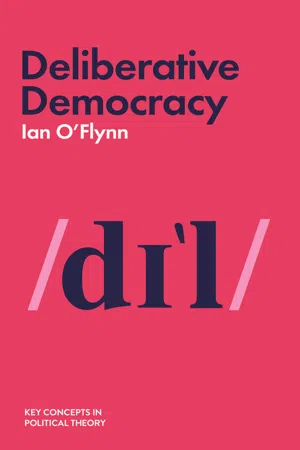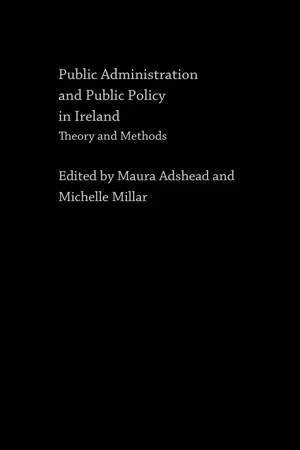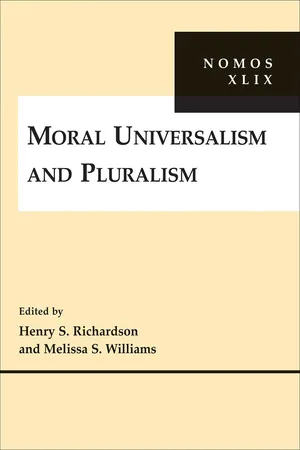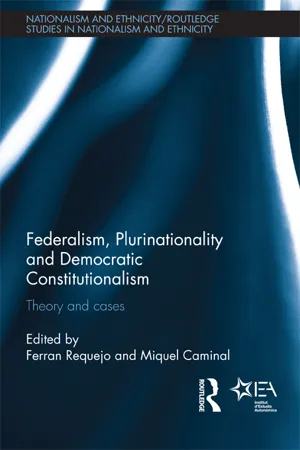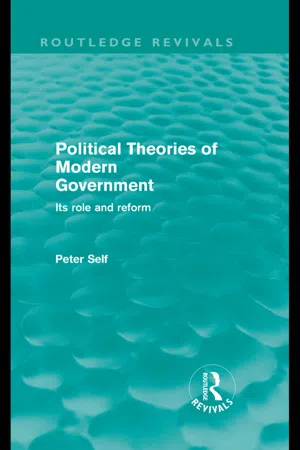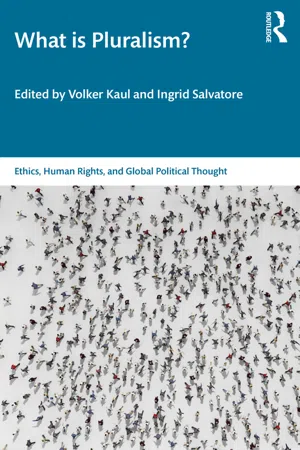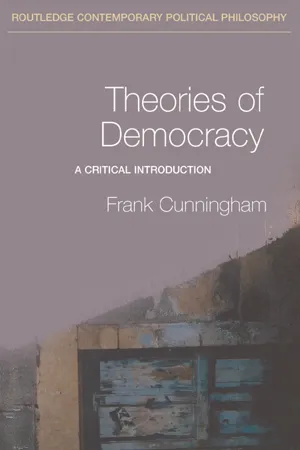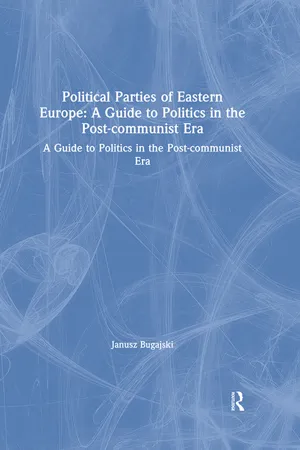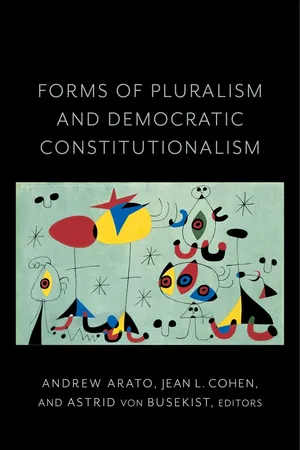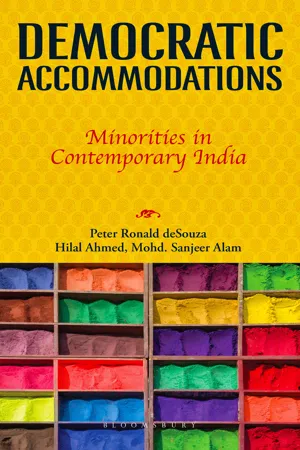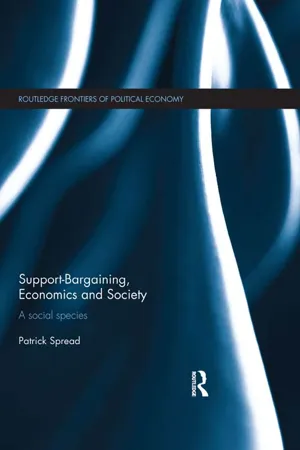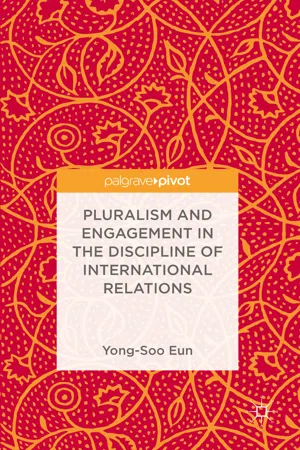Politics & International Relations
Pluralist Democracy
Pluralist democracy is a political system where power is dispersed among various groups and organizations, allowing for multiple voices and interests to influence decision-making. It emphasizes the existence of diverse and competing interest groups, and the government acts as a mediator among them. Pluralist democracies aim to ensure that no single group dominates the political process.
Written by Perlego with AI-assistance
Related key terms
12 Key excerpts on "Pluralist Democracy"
- eBook - ePub
- Ian O'Flynn(Author)
- 2021(Publication Date)
- Polity(Publisher)
The word ‘pluralism’ can mean different things depending on who you ask. For some, pluralism is a political project that has its origins in opposition to the idea of an absolutist state. State power should be dispersed rather than centralized. There should be multiple power centres such that no one group or faction can dominate politics or society. While groups and factions will still compete, the dispersal of power is intended to ensure that different identities and interests are treated with equal consideration. On this view, democracy is viewed as a marketplace with more or less perfect competition. Since no group or faction has a monopoly of influence, the equilibrium that results has a good claim to be in the public interest or common good (Dahl 1989, 295).This conception of pluralism (sometimes referred to as ‘interest group pluralism’) has been highly influential. In the post-war period, it was ‘the dominant paradigm in US political science and had a considerable impact on the analysis of politics in the rest of the world’ (Smith 2006, 25). It is not, however, how many political theorists think about the word. Sometimes, they use it to refer to the fact that people embrace different and conflicting values and beliefs, grounded in different and competing cultural or religious worldviews or conceptions of the good. So defined, ‘pluralism’ is essentially a descriptive word. It describes an ineradicable feature of our social world that, due in large part to mass immigration and other effects of globalization, has become increasingly pronounced. More usually, however, political theorists use the word not just descriptively, but also normatively. Pluralism refers not just to an ineliminable feature of our world, but to how we should respond to that feature.For example, according to multiculturalists such as Charles Taylor (1989, 1994, 1995), cultures and religions are not mere social facts, but are crucial to our sense of who we are. Cultures and religions embody what Taylor terms ‘strong evaluations’, by which he means standards of belief and value according to which we judge the direction of our lives towards or away from those standards. Importantly, strong evaluations are not simply chosen since they tend to be implicit in the social environment in which we grow up and lead our lives. They permeate the language that we speak and share with others. Accordingly, the full definition of our identity usually involves some reference to a larger linguistic community or social group. - eBook - ePub
Public Administration and Public Policy in Ireland
Theory and Methods
- Maura Adshead, Michelle Millar, Maura Adshead, Michelle Millar(Authors)
- 2003(Publication Date)
- Routledge(Publisher)
However, as one group of commentators has pointed out, in practice pluralism has tended to occupy an uneasy 'no man's-land between being a "normative" theory of how politics ought to be conducted and a "positive" theory of how groups actually do operate' (Gallagher et al. 2001: 407). A useful definition of pluralism for our purposes is: a system of interest representation in which the constituent units are organised into an unspecified number of multiple, voluntary, competitive, non-hierarchically ordered and self-determined (as to type or scope of interest) categories which are not specifically licensed, recognised, subsidised, created or otherwise controlled in leadership selection or interest articulation by the state, and which do not exercise a monopoly of representational activity within their respective categories. (Schmitter 1974: 96) The pluralist model of interest group behaviour is open to activity in any sphere of political engagement, unlike corporatism, which exclusively refers to the management of the economy and the roles of the unions and employers. To this extent this chapter concentrates on certain non-economic interests, namely moral interest groups, and examines how successful (and to what extent) these groups have been in putting pressure on the decision-making system. Brief review of the evolution of pluralism Pluralism as a normative theory has its origins in the early liberal political philosophy of Locke and Montesquieu. Its first systematic development can be traced back to the contribution of James Madison to The Federalist Papers, in which he argued that the multiplicity of interests and groups in society needed to find expression in a political voice so that stability and order in society would be ensured. He thus proposed a system of divided government based on the separation of powers that would offer a variety of access points to competing groups and interests (Heywood 1997: 76) - eBook - ePub
Moral Universalism and Pluralism
NOMOS XLIX
- Melissa S. Williams, Henry S. Richardson(Authors)
- 2008(Publication Date)
- NYU Press(Publisher)
5 THE IDEA OF POLITICAL PLURALISM WILLIAM A. GALSTON I NTRODUCTION : A S KETCH OF L IBERAL PLURALISM We often use the phrase “liberal democracy,” but we don’t always think about it very carefully. The noun points to a particular structure of politics in which decisions are made, directly or indirectly, by the people as a whole; and more broadly, to an understanding of politics in which all legitimate power flows from the people. The adjective points to a particular understanding of the scope of politics, in which the domain of legitimate political decision-making is seen as inherently limited. Liberal governance acknowledges that important spheres of human life are wholly or partly outside the purview of political power. It stands as a barrier against all forms of total power, including the power of democratic majorities. The question then arises, How are we to understand the nature and extent of limits on government? The signers of the U.S. Declaration of Independence appealed to the self-evidence of certain truths, among them the concept of individuals as bearers of rights that both orient and restrict governmental power. Today, individual rights represent an important (some would say dominant) part of our moral vocabulary. The question is whether they are sufficient to explain and justify the full range of constraints we may wish to impose on the exercise of public power—for example, limits on government’s right to intervene in the internal affairs of civil associations and faith-based institutions. In a recent book, Liberal Pluralism, 1 I argue that we must develop a more complex theory of the limits to government. In this endeavor, three concepts are of special importance. The first is political pluralism, an understanding of social life that comprises multiple sources of authority—individuals, parents, civil associations, faith-based institutions, and the state, among others—no one of which is dominant in all spheres, for all purposes, on all occasions - Ferran Requejo, Miquel Caminal Badia(Authors)
- 2012(Publication Date)
- Routledge(Publisher)
one person, one vote principle to be complied with, and it has yet to be complied with universally even now.With regard to the political and institutional organization of a democratic state, in some cases pluralism must ensure that political minorities can become majorities in the future, in order to guarantee the democratic rules of the game that prevent majorities from perpetuating themselves in power by abusing their status. In other cases, it is a question of regulating the protection and the possibility of development of permanent cultural and national minorities – those which are unable to become majorities for demographic reasons. It must also open channels for the expression, manifestation, autonomous organization and social and institutional recognition of the diversity of beliefs, values, ideas, customs, as well as political options and those of any other economic, social and cultural nature. Liberal society has been built on the foundations of uniformity; its democratization involves the recognition and expression of its diversity.2 Democracy and national pluralism
A very important aspect of this diversity is national pluralism. It is fair to say that until the end of the twentieth century the model that identified the state was the national state, as the synthesis and conciliation between the state and the nation. The state identified the nation, not the other way round. Thus, the view that the state, whether it was Spain, France, Argentina, Switzerland or any other, constituted ipso facto a nation was never questioned or put to the test. The original model and maximum expression of the state-nation equivalence was France.5- eBook - ePub
Political Theories of Modern Government (Routledge Revivals)
Its Role and Reform
- Peter Self(Author)
- 2009(Publication Date)
- Routledge(Publisher)
Throughout this chapter, we have been dealing primarily with modern American-style pluralism rather than with the earlier English or European variety. This earlier pluralism stressed the value of self-governing ‘intermediate institutions’ for their own sake and as a bulwark against centralized power. The pluralist ideal is the cultivation of a great variety of such institutions, which might take the forms both of self-governing local communities and of self-governing associations for purposes of religion, culture, trade and the professions. As Eckstein (1973) argues in the case of Norway, democracy proves most stable when its practices pervade a wide range of social institutions.This pluralist ideal is severely compromised by the growth of concentrations of economic and professional power which receive governmental recognition and support. Government is responding to group pressures which go contrary to the older pluralist ideals. The conferment of coercive power upon any organization should at the very least entail tests of its representative character and of its accountability to some broader forum for the use of its powers. Tests of this kind are largely lacking in Western societies.A basic problem with modern pluralism is the range and complexity of the tentacles of government which embrace all intermediate institutions within their grasp. No longer is there a clear distance between central government and other institutions, so that in each case policy can be made and accountability can be established within a defined and intelligible framework. Instead, the policy process works through a complex web of administrative and political networks. It thus becomes hard, if not sometimes impossible, to apportion responsibility for the exercise of power or to establish the accountability of decision makers. Consequently, political elections and party policies also lose a large part of their significance. Democracy may be destroyed by over-centralization of power, but it may also wither on the vine of excessive fragmentation and complexity.These developments have destroyed much of the traditional association between pluralism and liberalism. Shils (1956, p. 154) argued that: ‘Liberalism is a system of pluralism. It is a system of many centres of power, many areas of privacy and a strong internal impulse towards the mutual adaption of the spheres, rather than the dominance or submission of any one to the others.’ - eBook - ePub
- Volker Kaul, Ingrid Salvatore(Authors)
- 2020(Publication Date)
- Routledge India(Publisher)
8 A PLURALIST MODEL OF DEMOCRACYMaeve CookePluralism has been a topic in Anglophone democratic theory for a long time. Think of Harrington in the 17th century,1 Madison in the 18th century,2 John Stuart Mill in the 19th century,3 Dahl in the 20th century.4 Some debates on the topic have focused on the competing interests of individuals and groups; others have focused on the divergent and possibly conflicting values of individuals and groups.My concern in the following is with pluralism of values rather than interests. By “value pluralism”, I mean a multiplicity of ideas as to how human beings should live their lives, as incorporated in everyday behaviour and practices. Such ideas may be based on cultural traditions, religious beliefs, philosophical positions, political ideologies or other allegiances: Differences of this kind are not relevant to my discussion. For the sake of simplicity, I focus on value pluralism at the intersubjective as opposed to intra-subjective level: on encounters between human subjects who hold diverging or conflicting ideas of the good life. Indeed, my focus is even narrower: I am concerned with encounters between citizens in modern democracies who hold diverging or conflicting ideas of the good life.In the history of democratic modernity, such encounters have often been seen as a source of social divisiveness, both by political theorists and those actively engaged in political affairs. They have also been seen as a threat to individual freedom, calling for freedom’s protection against attack, typically through a system of rights. Indisputably, conflicts of values have given rise to terrible social conflicts. Moreover, they continue to be socially divisive. In these turbulent times of global migration, with the consequent increase in encounters between people who hold diverging or conflicting ideas of the good life, it is readily conceivable that things will get worse rather than better. The main aim of my discussion is to sketch a model of pluralist politics as a basis for exploring the kinds of institutional framework and practices of socialization that could make things better. In the political-philosophical perspective I outline, encounters between diverging or conflicting ideas of the good life are seen as strengthening social bonds rather than as weakening them and as conducive to individual freedom rather than threatening it. - eBook - ePub
Theories of Democracy
A Critical Introduction
- Frank Cunningham(Author)
- 2002(Publication Date)
- Routledge(Publisher)
The most persistent and systematic criticisms of classic pluralism have come from the political left and have focused on its empirical claim that power in the US is widely dispersed. This is the task that William Domhoff set himself in a criticism of Rose (1970: ch. 9). He partly frames his challenge as a defence of C. Wright Mills’ claim that the US is run by a ‘power elite’ (Mills 1956) against criticisms of Mills by the pluralists (Domhoff 1967: ch. 7). A demonstration that political power in the US is concentrated in a few hands certainly challenges classic pluralist empirical claims to the contrary, but by itself it does not disprove the pluralist theory of democracy, which only holds that dispersal of power is necessary for democracy not that power in every society calling itself democratic is in fact dispersed. It is for this reason that some have seen Mills’ theory not as an alternative to pluralism, but as a special-case application of it where one interest group possesses a disproportionately large amount of power (Balbus 1971).One way to strengthen the specifically theoretical aspect of this criticism is to argue not just that pluralism’s analysis of democracy in the US is empirically flawed, but that its conception of democracy generally is parochially limited. David Held advances this criticism when he maintains that pluralist identification of democracy with power politics in Western countries means that questions that ‘have been part of democratic theory from Athens to nineteenth Century England’ such as the appropriate extent of citizen participation are ‘put aside, or, rather, answered merely by reference to current practice’ (1996: 209). Another criticism is that of E.E. Schattschneider who argues that in limiting itself to the analysis of pressure groups, pluralists are bound to arrive at a skewed picture of democratic politics, since relatively few can direct the requisite time or other resources into this activity: ‘The flaw in the pluralist heaven is that the heavenly chorus sings with a strong upper-class accent. Probably 90 per cent of the people cannot get into the pressure system’ (1960: 35). - eBook - ePub
Political Parties of Eastern Europe: A Guide to Politics in the Post-communist Era
A Guide to Politics in the Post-communist Era
- Janusz Bugajski(Author)
- 2020(Publication Date)
- Routledge(Publisher)
In much of Southeastern Europe, the reform process has been obstructed by an entrenched post-communist political stratum, sometimes in alliance with populist or nationalist streams in the ex-dissident movement. Sectors of the old elite have managed to benefit directly from the limited reforms undertaken, preserving many of their offices, privileges, and resources. The development of a participatory civic society and the rule of law have been delayed by an assortment of authoritarian forces, many of which have manipulated populist, nationalist, welfarist, and statist themes to uphold their political positions. These negative trends have been particularly evident in several former Yugoslav republics, where the process of state building (or rebuilding) has taken precedence over political and economic reform, even though their points of departure in the late 1980s were comparable to those of the Central European states.Democracy, Pluralism, and CapitalismAn enormous literature exists in political theory on the definition of democracy. Michael Saward considers “responsive rule” the prime determinant of democracy, measured in terms of the correspondence between acts of government and the wishes of citizens, and in the establishment and functioning of procedures designed to secure responsiveness.12 In this context, the major indices of democratization include basic freedoms (speech, movement, assembly, and association); citizenship and participation to maximize responsive rule (the right to run for public office and to vote); appropriate administrative codes (governmental accountability and public notification); and adequate social rights (in health, security, and education). All such rights and freedoms must be guaranteed to each citizen regardless of the will of the majority or the minority, and they must be protected by the constitution and by a judicial system that is not part of the majoritarian decision-making process.According to David Beetham, democracy is concerned with the making of collectively binding decisions about the rules and policies of a society.13 - Jean Cohen, Andrew Arato, Astrid von Busekist(Authors)
- 2018(Publication Date)
- Columbia University Press(Publisher)
INTRODUCTIONANDREW ARATO AND JEAN L. COHENForms of Pluralism and Democratic ConstitutionalismI ssues of political form and jurisdiction are once again on the international intellectual agenda. This is so in part due to the increase and politicization of plurality within societies, and even more to the challenges posed by political and legal globalization, the proliferation of transnational legal regimes, and the increased mobility of persons, legal and artificial, across borders. Two questions animate this volume: “What political form is best suited to preserving and expanding the achievements of democratic constitutionalism in our globalizing and pluralistic twenty-first-century world?” and “What principles should structure the allocation of jurisdiction and representation in a democratic polity?” We use the term political form to refer to the type of polity operating in the international order: that is, whether it is a sovereign state, a nation-state, an empire, an international organization, a confederation, a federation of states, or a federal state. This dimension is distinct from regime type and multicultural policy.1 Indeed, the very way we pose the question entails that the political regime we are presupposing/advocating is a democratic constitutionalist one. The volume’s consideration of what forms of organized pluralism are compatible with it focuses less on multicultural policies or the specifics of democratic regime type and more on jurisdictional pluralism, political forms of the polity, and their effects. We thus take up the pressing question of how to deal with societal pluralism, and deep divisions over values and ways of life, from a distinct political theoretical perspective.It is our thesis that questions of political form and jurisdiction have again become highly salient thanks to the current, albeit hardly the first, crisis of the modern sovereign nation-state. Historians are right to describe the nineteenth century as the age of nationalism. Although many also depict the twentieth century as the triumph of the nation-state, with more justice it could be called the century of its failure, given the disastrous wars engaged in by and over nation-states despite the vast proliferation of the form.2- eBook - ePub
Democratic Accommodations
Minorities in Contemporary India
- Peter Ronald deSouza, Hilal Ahmed, Mohd. Sanjeer Alam(Authors)
- 2019(Publication Date)
- Bloomsbury India(Publisher)
Chapter 1Assertive PluralismIntroduction: Pluralism and DemocracyMost nation-states in the contemporary world are characterised by multi-ethnic and multicultural populations. Even the so-called monocultural nations have now to accept the social fact that they are characterised by a multi-ethnic and multicultural present that produces social dynamics they cannot ignore. There are communities within them that have either disagreed with the majority culture and have hence seceded from it,1 or find it at variance from the one with which they have grown up, and hence consider it as a culture to be resisted. This social and demographic plurality has evolved because of many factors—long histories of changing or shifting territorial boundaries, occupation by foreign powers, growing economies especially after the Second World War where immigration was encouraged to meet labour needs, violent conflicts across the world from which people have fled, and most significantly, the legacies of colonial and imperial pasts. This last factor has given the erstwhile colonised people ‘some claims’2 against their colonial masters. It is a history that has produced new facts on the ground that is often neither recognised nor accepted3 by the erstwhile colonisers (Osborn, 2002). The emergence of national populations with varying ethnocultural characteristics has, as a result of these various historical processes, exposed today’s nations to a variety of issues.4As this plurality unfolds across the world we see ethnic and cultural conflicts emerging that are a consequence of the politics among different groups of ‘imagining the nation’ and of integrating minority groups within the wider society. This produces contests between individual and group rights. There are demands for recognition of these differences and for according group rights due to such differences. There is the acknowledgement that the growing inequality between majority and minority groups, over time, has a cumulative character. - eBook - ePub
- Patrick Spread(Author)
- 2012(Publication Date)
- Routledge(Publisher)
Lukes interprets all the mysteries of perceptions, cognitions, social structuring, cultural patterns and collective forces as producing the willing compliance of people to the rule of an elite that is contrary to their interests, properly under-stood. He is concerned to persuade his readers that the system is unjust and requires remedy, if not necessarily the remedy of Karl Marx. He seeks to assem-ble support for social change which will give greater power to people. Mills is advancing the same cause. The analysts are part of the process by which support is assembled for different interests in a community, and hence part of the competition for political power. Their intellectual capacities enable them to contribute much information and analysis to the definition of communal situation, and consequently their concerns play a substantial role in establishing the under-standing of situation and interest in their communities. They consequently influ-ence the assembly of support.Pluralist Democracy: Dahl in New Haven
Lukes tries to explain power from an ideological standpoint. Power is exercised in the third dimension because of the way people's minds have been influenced to accept or reject certain modes of government and certain types of leadership. In sharp contrast, other academic studies of power focus on actual events or decisions that seem to involve the exercise of power, seeking to deduce from observation and analysis of the process what it is that constitutes power. The studies also – and here the dissension arises – seek to establish whether the exercise of power is compatible with the idea of democracy. Can societies in which some people visibly have much greater influence on events than ordinary people reasonably be described as democratic?The democratic right tends to be more tolerant than the democratic left of imbalances of power in the government of society. The left may tolerate some modest degree of departure from the democratic ideal for the sake of expediency, though it seldom specifically acknowledges its tolerance. More commonly it is inclined to accentuate and condemn all departure from the ideal. The right accepts the need for leadership and decision for the advance of society, and is more tolerant of the establishment of ascendant groups that will provide these services, provided first that the people are able to engage in the political process through elections, and second that there is sufficient diversity in the conduct of government to prevent the emergence of a monolithic power elite. There has to be competition between many groups for ascendancy and government, with their activities reported to the wider community. - Yong-Soo Eun(Author)
- 2016(Publication Date)
- Palgrave Macmillan(Publisher)
2014 ).Furthermore, in discussions of visions of a better future for IR scholarship, pluralism is also regarded as what we must pursue and achieve. Friedrich Kratochwil (2003 : 126), for example, holds that pluralism is “not as the second best alternative but actually the most promising strategy for furthering research and the production of knowledge” in the Forum that the ISA put together in the hope of identifying “new directions for the field” at the dawn of the twenty-first century. Going a step further, in the same Forum, Yosef Lapid calls attention to an “engaged” form of pluralism, pointing to the importance of “dialogue,” as well as to the diversity of approaches, in the study of international relations. In his words: if “engaged pluralism … is the most feasible and deserving destination for the international relations theory enterprise in the foreseeable future, then dialogue must figure prominently on our agenda at the dawn of the twenty-first century” (Lapid 2003 : 129). In effect, the underlying assumption of the Forum, as the Editor has made clear, was that IR is badly in need of “dialogue, pluralism, and synthesis” if it is to have a better future (Hellmann 2003 : 123, 147–150). And this view continues to resonate in today’s IR. Yale Ferguson, for example, writes that IR analysts “need to be conversant with a wide range of theories … [because] viewing some subjects simultaneously from more than one theoretical perspective often enhances understanding of global politics” (Ferguson 2015 : 3). Additionally, Richard Ned Lebow claims that “[p]luralism must be valued as an end in its own right but also as an effective means of encouraging dialogue across approaches, something from which we all have something to learn” (Lebow 2011
Index pages curate the most relevant extracts from our library of academic textbooks. They’ve been created using an in-house natural language model (NLM), each adding context and meaning to key research topics.
